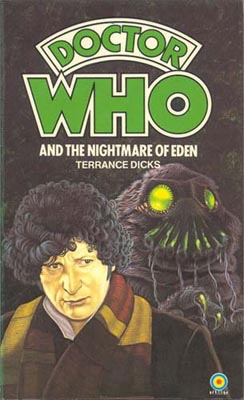Nightmare of Eden
Doctor Who and the Nightmare of Eden

|
Nightmare of Eden |
Target novelisation Doctor Who and the Nightmare of Eden |

|
| Author | Terrance Dicks |  |
| Published | 1980 | |
| ISBN | 0 426 20130 2 | |
| First Edition Cover | Andrew Skilleter |
| Back cover blurb: A freak accident locks two ships together in space - and a distress call brings the Doctor, Romana, and the faithful K9 onto the scene. The Doctor's efforts to separate the two ships involve him with treacherous drug smugglers, ferocious monsters, and a savagely dangerous planet called Eden... |
"No arms, no legs, no everything" by Tim Roll-Pickering 11/9/06
Onscreen Nightmare of Eden is a relatively typical Graeme Williams era story, containing some good ideas that get buried beneath excess scientific jargon, far too much humour and several send-ups that only serve to undermine the more serious parts of the story. The scene of the Doctor fighting the Mandrels inthe bushes and screaming "My arms! My legs! My everything!" is one of those moments in the series that most fans find so cringeworthy they are almost scared of being caught watching the story by a non-fan.
But imagine if the humour were toned down, if the sets and costumes had been more subdued, if Tom Baker had stuck to the script and if other actors had not fluffed lines or adopted outrageous accents. Imagine a darker, more serious version of the story... Or else read Terrance Dicks' novelisation.
The infamous line is absent, with the Doctor now leaving the projection almost immediately after luring the Mandrels in. More generally, an attempt is made throughout the story to keep the plot on track, with the mysteries surrounding Vraxoin now being treated a lot more subtlely, though the "mystery" of who shot Stott is still so obvious it's a wonder Tryst even tried to disguise it. Reading this book one comes away with a far more positive image of the story than onscreen. That's not to say that it isn't without its errors, with some particularly noticable typos (a general problem with a number of books from this time, all containing spelling errors and confusing quotemarks), whilst the effects of Vraxoin are still not really spelled out beyond demonstrating addiction and abandonment of routine. But the prose is such that the story moves fast and manages to leave the reader not wondering about these questions. In a time when the novelisations were generally extremely dull and following a hideously set routine, this is an example of how at least to do that routine right. 5/10